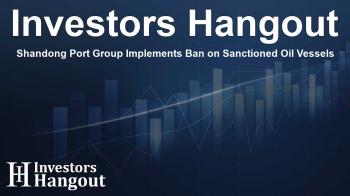Shandong Port Group Implements Ban on Sanctioned Oil Vessels

Shandong Port Group Takes Action Against Sanctioned Oil Vessels
Recently, significant actions taken by Shandong Port Group have come to light, impacting the operations of U.S. sanctioned oil vessels. This decision, reported widely, indicates a shift in China's approach to international trade, especially regarding energy imports.
Details of the Ban
The new regulation explicitly states that any vessel listed under the Office of Foreign Assets Control, managed by the U.S. Department of Treasury, is prohibited from docking or conducting activities at Shandong's network of ports. This includes vital terminals located in cities such as Qingdao, Yantai, and Rizhao, all of which are key locations in China's energy import strategy.
Significance of the Terminals
The ports under the jurisdiction of Shandong Port Group are crucial for oil imports, facilitating a substantial amount of the country's energy needs. With this prohibition in place, it may create ripples throughout the global oil market, especially for those vessels that find themselves on the blacklist.
Market Reactions and Implications
The news has already begun stirring reactions among traders and analysts alike. The impact of losing access to these major terminals could prompt operational shifts for several oil companies. Traders emphasize that these developments could lead to supply chain disruptions, potentially affecting oil prices both domestically and internationally.
Unsourced Responses
Interestingly, Shandong Port Group has yet to publicly comment on this significant change, leaving many to speculate about their motivations. Industry experts suggest that this move could be part of a broader geopolitical strategy, reflecting China's ongoing adjustments to its foreign trade policies.
Future Outlook
As the situation develops, many are keeping a close watch on the implications this ban may have on future trade dynamics. With global energy markets consistently evolving, the decisions made by key players like the Shandong Port Group will undoubtedly shape the landscape in the coming months.
Frequently Asked Questions
What is the reason behind the ban on U.S. sanctioned oil vessels?
The ban has been instituted by Shandong Port Group to comply with restrictions related to U.S. sanctions.
Which ports are affected by this decision?
Major ports such as Qingdao, Rizhao, and Yantai are directly affected by the ban.
What impact might this have on global oil trade?
This could lead to disruptions in supply chains and potentially affect oil prices worldwide.
Has Shandong Port Group commented on this situation?
No, the group has not publicly commented on the new regulations yet.
How are traders responding to this ban?
Traders express concerns about supply chain disruptions and possible impacts on oil trading operations.
About Investors Hangout
Investors Hangout is a leading online stock forum for financial discussion and learning, offering a wide range of free tools and resources. It draws in traders of all levels, who exchange market knowledge, investigate trading tactics, and keep an eye on industry developments in real time. Featuring financial articles, stock message boards, quotes, charts, company profiles, and live news updates. Through cooperative learning and a wealth of informational resources, it helps users from novices creating their first portfolios to experts honing their techniques. Join Investors Hangout today: https://investorshangout.com/
Disclaimer: The content of this article is solely for general informational purposes only; it does not represent legal, financial, or investment advice. Investors Hangout does not offer financial advice; the author is not a licensed financial advisor. Consult a qualified advisor before making any financial or investment decisions based on this article. The author's interpretation of publicly available data shapes the opinions presented here; as a result, they should not be taken as advice to purchase, sell, or hold any securities mentioned or any other investments. The author does not guarantee the accuracy, completeness, or timeliness of any material, providing it "as is." Information and market conditions may change; past performance is not indicative of future outcomes. If any of the material offered here is inaccurate, please contact us for corrections.
